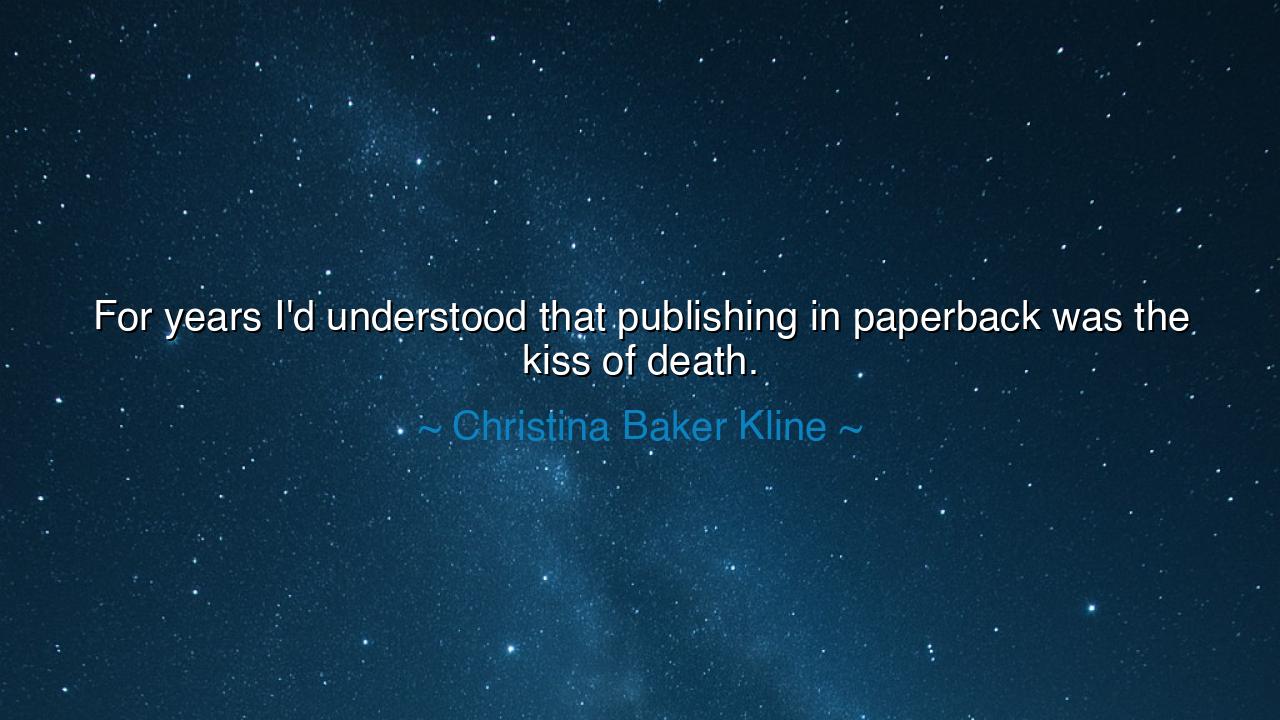
For years I'd understood that publishing in paperback was the






The novelist Christina Baker Kline, whose pen has captured the quiet endurance of human hearts, once said: “For years I’d understood that publishing in paperback was the kiss of death.” Though her words seem to speak merely of books, they echo a truth far deeper — a truth about perception, status, and the way the world measures worth. Beneath this simple statement lies a story of how dreams are judged not only by their essence, but by their appearance. And yet, as time proved, what was once seen as the kiss of death became, in her case, the breath of life that carried her work into the hands of millions.
In the realm of publishing, as in all human endeavor, there has long been a hierarchy — hardcover before paperback, prestige before popularity, exclusivity before accessibility. The hardcover was seen as the throne of literature, the mark of success, while the paperback, cheap and ordinary, was dismissed as a thing of the masses. To be printed in paperback was to be whispered about as one whose work had failed to ascend the mountain of acclaim. And so, for years, many writers — like Kline herself — feared that such a fate would end their dreams. But this belief, like so many illusions of power, was a relic of pride, destined to crumble beneath the weight of truth.
Yet life has a way of turning shame into triumph, of using rejection as a forge for greatness. Christina Baker Kline’s own story became a living parable of this transformation. When her novel Orphan Train was released in paperback, contrary to the superstition she had once believed, it did not sink into obscurity — it soared. The humble format carried it far beyond the circles of critics and scholars, into the homes and hearts of ordinary readers. What had been called the kiss of death became the very path of resurrection. Through her, the world was reminded that greatness does not depend on form, but on substance, and that true art finds its way to those who need it most.
Such a reversal has been seen before, in many ages and in many forms. Consider Galileo Galilei, whose work was condemned by the learned men of his time as heresy. The very ideas that were branded dangerous — unworthy of serious thought — became the pillars of modern science. Or Vincent van Gogh, whose paintings were once unsellable, dismissed as crude, only to become symbols of spiritual vision. What society calls failure is often the seed of enduring success. The appearance of disgrace is often the disguise of destiny.
Kline’s quote speaks not only of the publishing world, but of the human condition itself — of how easily we mistake status for substance, how quick we are to believe the judgments of others about what defines success. For years, she “understood” that paperback was failure, because that was what the world told her. Yet the world’s wisdom is often folly, and only through living can one see it. When she witnessed her so-called failure bloom into triumph, she learned a lesson as old as time: nothing external can define the value of your creation. The world’s rejection does not diminish your worth; it merely tests your conviction.
The origin of her statement lies in the world of modern publishing — a realm not unlike the courts of kings, where reputation is a currency and perception shapes fate. But the truth that emerged from her experience belongs to all who have ever feared humiliation or obscurity. It teaches that humility is not defeat, but freedom. The paperback, once dismissed as lesser, became a vessel of connection — cheaper, lighter, and more enduring. In this way, the story of a book becomes the story of life itself: what is humble endures; what is proud often fades.
So what lesson can we, as seekers of truth, take from her words? It is this: never let the world’s labels define your destiny. The judgments of others are but passing shadows, while the essence of your work — your integrity, your devotion, your love — endures. If your path seems humble, walk it with pride. If your efforts are dismissed, let time be your witness. For the measure of true success lies not in prestige, but in impact, not in glitter, but in light.
Thus, as Christina Baker Kline reminds us, the so-called kiss of death may well be the breath of rebirth. The world may sneer at the humble form, but destiny smiles upon the sincere heart. Whether you build, write, or dream, let not fear of appearance still your hand. Do your work faithfully, offer it to the world, and let time reveal its power. For in the end, the lesson is eternal: what matters is not how the world receives you, but that you remain true to your gift — for the truth, like a well-loved paperback, will never perish, but will live forever in the hands of those who are moved by it.






AAdministratorAdministrator
Welcome, honored guests. Please leave a comment, we will respond soon